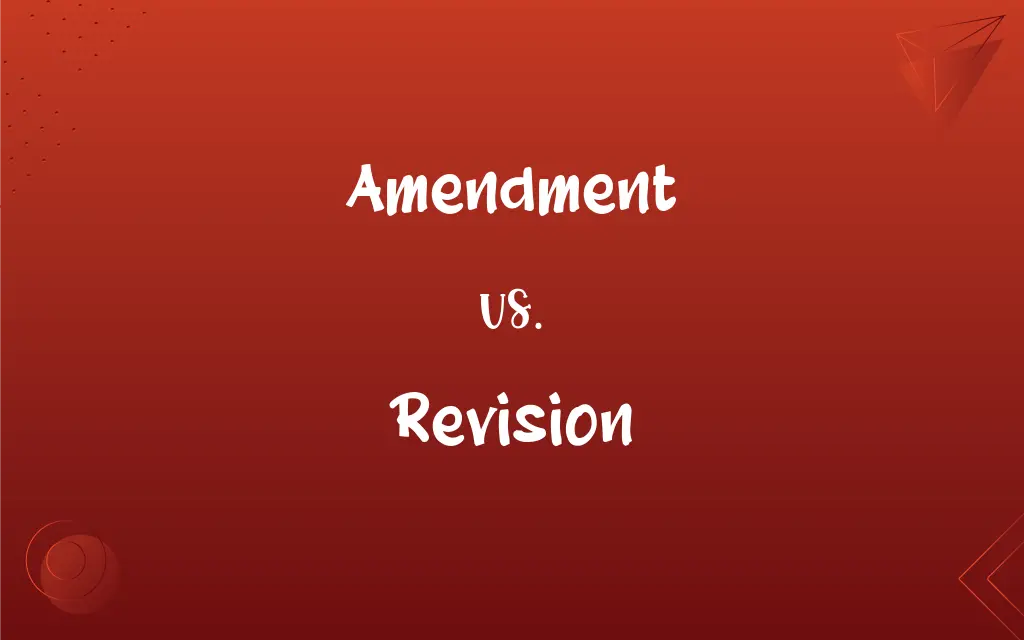Amendment vs. Revision: What's the Difference?
By Janet White || Published on December 1, 2023
An amendment is a formal change or addition to a document, often legal, while revision refers to the process of reviewing and altering a document or work.

Key Differences
An amendment involves making precise changes or additions to an existing document, often to improve or update it. Whereas, revision encompasses a broader process of reviewing and modifying content, focusing on improvement and correction.
Amendments are commonly associated with legal documents, like constitutions or contracts, signifying formal changes. However, revisions are more general, applied to various types of works, including academic papers, policies, and literary works, for refinement and update.
The process of amending usually requires approval from authoritative bodies, reflecting its formal nature. Revision, meanwhile, can be undertaken by individuals or groups and often involves multiple iterations and refinements.
An amendment typically retains the original structure and intent of the document, adding or altering specific aspects. In contrast, revision can involve significant reorganization, rewriting, or rethinking of the original content.
Amendments are often necessary to keep legal or formal documents relevant and effective. Revision is a key part of the writing process, essential for clarity, coherence, and overall quality of the work.
ADVERTISEMENT
Comparison Chart
Definition
Formal change or addition to a document
Reviewing and altering content or work
Common Contexts
Legal documents, constitutions, contracts
Academic papers, policies, literary works
Approval Process
Often requires authority or legislative body
Typically done by individuals or editorial teams
Nature of Changes
Specific and targeted changes
Can involve extensive rewriting or reorganization
Purpose
To update or correct specific parts
To improve overall quality and coherence
ADVERTISEMENT
Amendment and Revision Definitions
Amendment
In legal contexts, an amendment modifies a law, contract, or constitution.
The constitutional amendment granted new rights to citizens.
Revision
Revision involves reviewing and altering a document or work.
After feedback, the author undertook a thorough revision of the manuscript.
Amendment
Amendment refers to a formal alteration or addition made to a document.
The company made an amendment to its employee handbook regarding remote work policies.
Revision
In academics, revision refers to the study or review of material previously learned.
The students did a quick revision of the chapter before the test.
Amendment
Amendment can also imply a correction of errors in a document.
The amendment to the report included corrected financial figures.
Revision
Technologically, revision can refer to an updated version of a software or product.
The latest revision of the software included several new features.
Amendment
Amendment often suggests a minor change to improve or clarify a text.
The policy amendment addressed the previously ambiguous terms.
Revision
Revision can mean the process of improving a text for clarity and coherence.
The student's essay improved significantly after several revisions.
Amendment
In parliamentary procedure, an amendment is a formal change proposed to a motion.
The senator proposed an amendment to the bill before the vote.
Revision
Revision may involve reorganizing content for better flow and understanding.
The revision of the article included restructuring several sections for clarity.
Amendment
The act of changing for the better; improvement
"Society may sometimes show signs of repentance and amendment" (George G. Coulton).
Revision
The act or process of revising.
Amendment
A correction or alteration, as in a manuscript.
Revision
A revised or new version, as of a book or other written material.
FAQs
What is a revision?
The process of reviewing and altering a document or work.
Where are amendments commonly used?
In legal documents, constitutions, and contracts.
What's the purpose of an amendment?
To update, correct, or improve a specific part of a document.
Does an amendment require approval?
Typically, especially in legal contexts.
What is an amendment?
A formal change or addition to a document.
Are amendments usually major changes?
They can be major or minor, but are specific and targeted.
Can an amendment alter the main purpose of a document?
Usually not; it tends to maintain the original intent.
What contexts require revisions?
In academic writing, policy development, and literature.
Is an amendment a part of legislative processes?
Yes, especially for laws and governmental policies.
Can revisions be extensive?
Yes, revisions can involve significant changes.
Why are revisions important?
For improving the quality and coherence of a work.
Do revisions keep the original structure?
Not always; they can include reorganization.
What is a typical example of a revision?
Rewriting parts of an essay for better clarity.
Can an amendment be reversed?
It's possible, though often requires another formal amendment.
Can revision be part of the learning process?
Yes, particularly in studying or reviewing academic material.
What is a common example of an amendment?
Adding a clause to a contract.
How often should revisions be done?
As often as necessary to achieve desired quality.
Is revision a one-time process?
No, it often involves multiple iterations for refinement.
Who can perform revisions?
Individuals, groups, or editorial teams.
Are amendments part of parliamentary procedures?
Yes, commonly in the form of proposed changes to motions or bills.
About Author
Written by
Janet WhiteJanet White has been an esteemed writer and blogger for Difference Wiki. Holding a Master's degree in Science and Medical Journalism from the prestigious Boston University, she has consistently demonstrated her expertise and passion for her field. When she's not immersed in her work, Janet relishes her time exercising, delving into a good book, and cherishing moments with friends and family.






































































